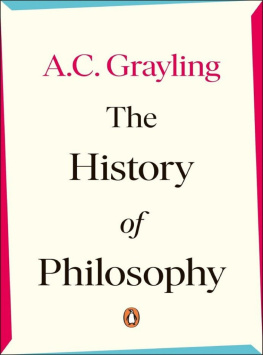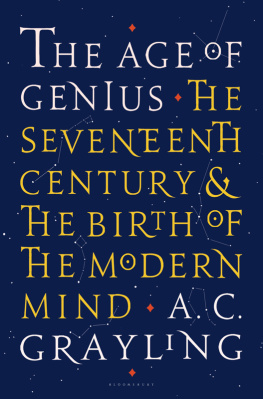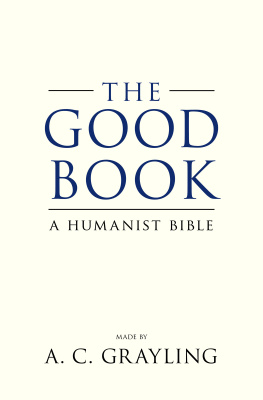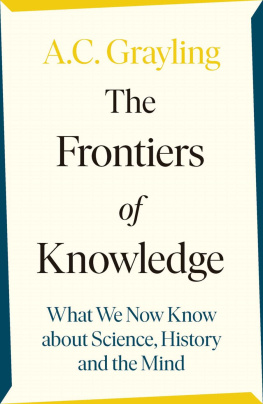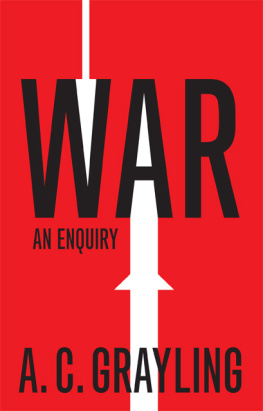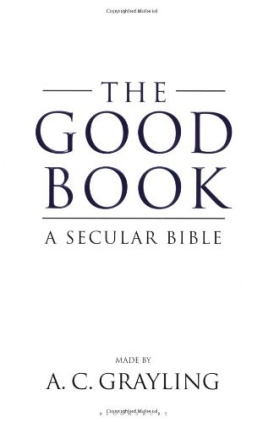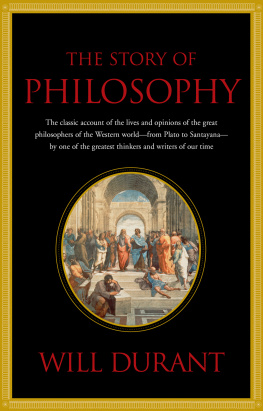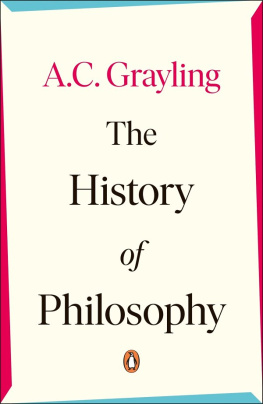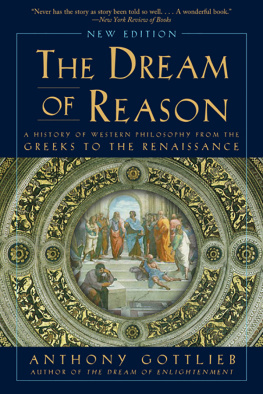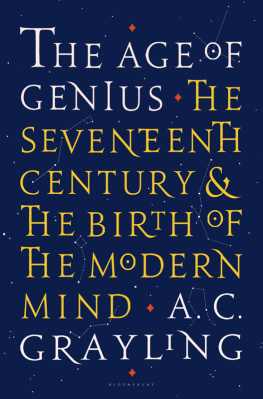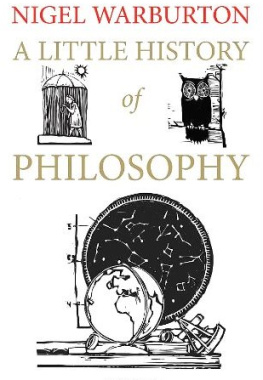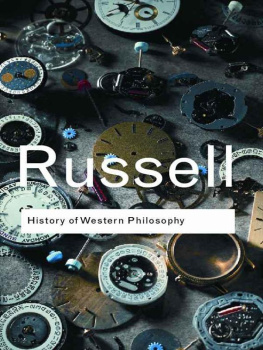
A. C. Grayling
THE HISTORY OF PHILOSOPHY

Contents
- PART I
Ancient Philosophy - PART II
Medieval and Renaissance Philosophy - PART III
Modern Philosophy - PART IV
Philosophy in the Twentieth Century - PART V
Indian, Chinese, ArabicPersian and African Philosophy
About the Author
Professor A. C. Grayling is Master of the New College of the Humanities, and a Supernumerary Fellow of St Annes College, Oxford. He has written and edited over thirty books on philosophy and other subjects, and has written on non-Western philosophy. For several years he wrote columns for the Guardian newspaper and The Times and was the chairman of the 2014 Man Booker Prize.
Preface
This survey of philosophys history is intended for the general interested reader and for those embarking on the study of philosophy. There are fine scholarly treatments of particular periods in the history of philosophy for those who wish to take their enquiries further, and I hope that some readers will be motivated by the following pages to turn to them, and above all to the primary literature of philosophy itself. Not all the classics of philosophy have an impenetrable veil of technicality and jargon draped over them, as is the case with too much contemporary philosophical writing, the result of the relatively recent professionalization of the subject. It was once taken for granted that educated people would be interested in philosophical ideas; the likes of Descartes, David Hume and John Stuart Mill accordingly wrote for everyone and not just for trained votaries of a profession.
To tell the story of philosophy is to offer an invitation and an entrance, much as Bertrand Russell did in his History of Western Philosophy, a book that achieved near-classic status for the sparkling clarity of its prose and its wit though not always for its accuracy, adequacy or impartiality. Nevertheless that was a book I relished as a schoolboy, along with its nineteenth-century predecessor, G. H. Lewes A Biographical History of Philosophy. It is a testament to both that, after the long intervals that have elapsed since they were written, one can enjoy them still, despite knowing that the explosion in more recent scholarship has added much to our understanding of philosophys history, and that philosophys history itself has grown longer and richer since their time. The ambition in what follows is to iterate their achievement for our own day, and to supplement the endeavour by looking not only (though mainly) at the Western tradition but beyond it to the other great traditions of thought the Indian, Chinese and ArabicPersian even if only in outline, to indicate comparisons.
An historical overview obviously does not pretend to offer a complete treatment of the thinkers and themes it discusses; for this one must go to primary sources and scholarly examinations of them. But not all readers intend to carry the study of philosophy further, and for their purposes it is important that they should be given a reliable account of the thinkers and debates constituting philosophys great story. That aim is fully in view here.
My method, accordingly, is to give as clear and concise an account as I can of philosophys main figures and ideas. Notes are kept to a minimum, and almost all are asides or amplifications, not textual references; there are bibliographies citing the main texts referred to, and works which will take readers further.
It is an almost irresistible temptation to discuss and debate, criticize and defend, when writing of philosophical ideas, for that is the very essence of philosophy. But in this kind of book that temptation has to be restrained to a considerable degree, not just because yielding to it would quadruple the books length, but because doing so is not the main point. At times, though, it is necessary to show why what followed from a given philosophers ideas was influential or prompted disagreement, so an evaluative element is not wholly absent.
Acknowledgements
My thanks go to my colleagues at the New College of the Humanities, especially to Dr Naomi Goulder and Dr David Mitchell, and friends and colleagues in philosophy there who have made the experience so rewarding: Simon Blackburn, Daniel Dennett, Peter Singer, Christopher Peacocke, Ken Gemes, Steven Pinker, Rebecca Goldstein and the late Ronald Dworkin. My thanks go also to Daniel Crewe of Viking Penguin, to Bill Swainson who first commissioned this book, to Catherine Clarke, to Mollie Charge and to the many students over the years who have taught me much about the thinkers and ideas surveyed in the following pages, proving the deep truth of the tag docendo disco.
Introduction
Philosophys history, as todays students and teachers of philosophy see it, is a retrospective construct. It is chosen from the wider stream of the history of ideas in order to provide todays philosophical concerns with their antecedents. This fact has to be noted if only to avoid confusion about the words philosophy and philosopher themselves. For almost all of its history philosophy had the general meaning of rational enquiry, though from the beginning of modern times in the Renaissance until the nineteenth century it more particularly meant what we now call science, though a philosopher was still someone who investigated anything and everything. Thus it is that King Lear says to Edgar, First let me talk with this philosopher: What is the cause of thunder? On William Hazlitts tombstone, engraved in 1830, the famous essayist is described as the first (unanswered) Metaphysician of the age, because at that time what we now call philosophy was called metaphysics to distinguish it from what we now call science. This distinction was often marked by the labels moral philosophy to mean what we now call philosophy, and natural philosophy to mean what we now call science.
The word scientist was coined as recently as 1833, giving the related word science the sense it now familiarly has. After that date the words philosophy and science took on their current meanings, as the sciences diverged more and more from general enquiry by their increasing specialism and technicality.
In contemporary philosophy the principal areas of enquiry are epistemology, metaphysics, logic, ethics, aesthetics, the philosophy of mind, the philosophy of language, political philosophy, the history of debates in these areas of enquiry, and philosophical examination of the assumptions, methods and claims of other fields of enquiry in science and social science. Most of this is, and certainly the first three are, the staple of a study of philosophy at universities in the Anglophone world and in Europe today.
And correlatively, these are the fields of enquiry that determine which strands in the general history of ideas are selected as todays history of philosophy, thus leaving aside the history of technology, astronomy, biology and medicine from antiquity onwards, the history of physics and chemistry since the seventeenth century, and the rise of the social sciences as defined disciplines since the eighteenth century.
To see what determines which strands in the history of ideas to fillet out as the history of philosophy we therefore need to look backwards through the lens of the various branches of contemporary philosophy as listed above, and this requires a preliminary understanding of what these branches are.
Next page
